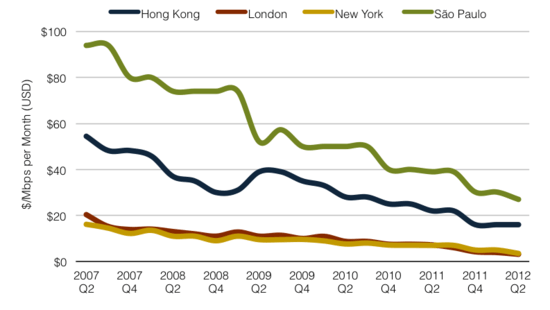An Australian Internet Service Provider that caps customer usage and charges extra if you want to exceed your allowance has taken to the company’s blog to argue that usage caps are fair, even as their customers start departing for competitors offering unlimited service.
iiNet chief technology officer John Lindsay defends the company’s usage-based billing scheme, which charges more than $30 a month for DSL service with a 20GB usage cap.
“Service providers in favour of a two-speed Internet argue that there is limited capacity on the Internet and that those using the most bandwidth by delivering rich content or transferring large files should pay more,” wrote Lindsay. “In Australia, we have a different business model for the Internet. ISPs operate on a pay-as-you-go model, which also shapes the consumer market. Here, consumers can choose a plan with upload and download quotas to fit their usage and pay according to their needs – the more you use, the more you pay.”

Lindsay
Unfortunately for Lindsay, an increasing number of Australians don’t agree and are switching to providers like TPG and Dodo, which have become enormously popular selling flat rate, unlimited broadband service.
Lindsay warns that if Australia adopts the flat rate service model popular in the United States, a Net Neutrality debate will be sparked as customers discover ISPs are unable to handle the traffic and start prioritizing their own content.
“Operating a quota based business model ensures we’re not responsible for policing activity online – our customers pay a fair price for the services they receive and we can focus on more important issues than where their traffic is coming from,” Lindsay argues. “While US providers argue about a two-tier system, our priority is to provide awesome customer service and ensure our customers enjoy a seamless experience online, whatever it is their Internet connection means to them.”
Of course, Lindsay’s characterization of the American broadband landscape is fact-challenged, because most broadband providers have plenty of capacity to deliver content. Some simply want to earn a new revenue stream from content producers for managing that traffic, even though paying customers already compensate them for that service.
Australia’s data caps have traditionally been onerous because of the higher costs and limited capacity of underseas cables that handle traffic inside and out of the Pacific Basin. But Australians have complained about the low caps for years — so loudly that the Australian government has made construction of a super-capacity fiber to the home network a national priority for the country as international capacity also increases.
Customers were not fooled by Lindsay’s rhetoric.
 “This is nonsense,” wrote Lachlan Hunt. “Australia’s model of capped usage limits with higher prices for higher caps, and of ISPs including yourself offering free zones where such data doesn’t count towards the monthly quota is exactly the problem that Net Neutrality advocates aim to deal with. It treats data from companies who choose to partner with you to get their content in the free zone as privileged compared with everyone else, and similarly with other ISPs.”
“This is nonsense,” wrote Lachlan Hunt. “Australia’s model of capped usage limits with higher prices for higher caps, and of ISPs including yourself offering free zones where such data doesn’t count towards the monthly quota is exactly the problem that Net Neutrality advocates aim to deal with. It treats data from companies who choose to partner with you to get their content in the free zone as privileged compared with everyone else, and similarly with other ISPs.”
Hunt complains iiNet’s caps were “ridiculously low” and interfered with his career in the web development industry. Today he lives and works in Europe, where usage caps are increasingly a thing of the past.
“I’m really hoping that you will eventually wake up and realize that usage caps go together with Non-Neutral internet, and with the introduction of the [national fiber to the home network], which brings both higher speeds and capacities, you should be able to lower prices, abolish usage caps and offer a fair model with pricing tiers based on the chosen speeds.”
Stop the Cap! also addressed Lindsay:
[…] We have learned dealing with this issue for several years that ISPs are terrified of their own argument if carried to its fullest extension. If iiNet wants customers to fairly pay for only what they use, they should be billing them on exactly that basis. A flat charge per gigabyte — no allowances/quotas, no penalty overage fees or speed throttles, no wasted, unused quota at the end of the month.
But they don’t dare. If you charged $1/GB (still a crime-gouge compared to the wholesale price), those customers currently paying $30 for up to 20GB service might suddenly be paying $5-15 instead.
[…] If you asked your customers whether they prefer unlimited service or your current cap system, most will clamor for unlimited, even if it costs them a bit more, just for the peace of mind of never facing overage charges or speed throttles.
This argument has never been about capacity. It’s about what it always is about: money.
 While Time Warner Cable will pull local channels off its cable lineup when contract negotiations fail, the company was less aggressive fighting demands from Fox News Channel parent company News Corp., and caved in to higher fees for the cable news network.
While Time Warner Cable will pull local channels off its cable lineup when contract negotiations fail, the company was less aggressive fighting demands from Fox News Channel parent company News Corp., and caved in to higher fees for the cable news network. The only concession Time Warner Cable seemed to win was a more limited renewal agreement that only covered the Fox News Channel, Fox Movie Channel, and the barely-watched Fox Business Network. Time Warner Cable officials refused to renegotiate earlier, yet to expire deals with less popular Fox-owned cable networks.
The only concession Time Warner Cable seemed to win was a more limited renewal agreement that only covered the Fox News Channel, Fox Movie Channel, and the barely-watched Fox Business Network. Time Warner Cable officials refused to renegotiate earlier, yet to expire deals with less popular Fox-owned cable networks.

 Subscribe
Subscribe





